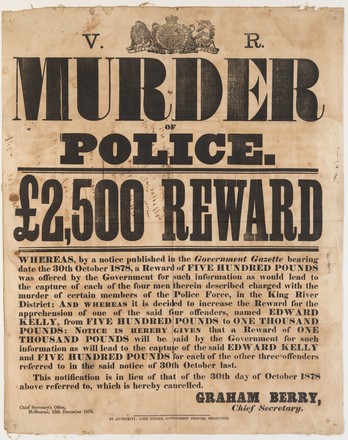Edward (Ned) Kelly was born in June 1855, in Beveridge, Victoria, the eldest son of eight children to John ‘Red’ Kelly and Ellen Quinn. As a child, young Ned was awarded for his bravery in saving another boy from drowning. But within a few years of this heroic act, Kelly caught the attention of the police, firstly for allegedly assaulting a Chinese man, and later as a suspected accomplice of bushranger Harry Power. Both charges were dismissed, but they marked the beginning of Kelly’s criminal life.
In April 1878, Kelly was accused of shooting a police officer named Fitzpatrick. Following the arrest and imprisonment of his mother for aiding and abetting an attempted murder, Ned and his brother Dan went into hiding, and were joined by Ned’s friend Jo Byrne and Dan’s friend Steve Hart. In October that year, the four ambushed a police camp at Stringybark Creek, where Ned shot and killed Sergeant Kennedy and Constables Lonigan and Scanlon. On 15 November, the Victorian government posted a reward of £500 for each of the members of the gang, dead or alive. In December the gang took possession of a sheep station near Euroa, and held up the National Bank, stealing £2000 in notes and gold. This crime resulted in a doubling of the price on Ned Kelly’s head.
On 12 December 1878, the Victorian Government Gazette carried a notice of the increase in the reward for the capture of Ned Kelly. Two days later, the Argus carried the following announcement:
In consequence of the latest exploit of the outlaws, the Government have decided to increase the reward for the apprehension or capture dead or alive, of Edward Kelly, from £500 to £1,000. This is notified in the Government Gazette and 700 or 800 calico posters, with that announcement, were last night forwarded to the districts in which the outrages were perpetrated. The total reward is thus brought up to £2,500. It is also announced in the Gazette that the Governor with the advice of the Executive Council, has appointed Inspecting-superintendent Nicolson to be assistant-commissioner of police.*
Despite the increased reward, the gang continued its crime spree. On 8 February 1879, they struck again at Jerilderie, taking possession of the police station and locking up two police officers. Wearing police uniforms, they held up the Bank of NSW, taking £2141 in notes and coin, and rounding up 60 hostages in the Royal Hotel next door. During the bank robbery, Kelly handed an 8000-word written statement to one of the tellers, which became known as the ‘Jerilderie letter’, in which he provided a justification for his conduct.
Again, the reward was increased – to £2000 a head – and Aboriginal trackers were brought from Queensland to assist in the search for the gang. In late June 1880, following the murder of police informant Aaron Sherritt by Joe Byrne, the gang took possession of the Glenrowan Hotel and detained around 60 people. In the ensuing shootout with police, and the fire which destroyed the hotel, Dan Kelly, Steve Hart and Joe Byrne died. Ned Kelly was shot and captured.
On 28 and 29 October 1880, Kelly was tried in Melbourne for the murder of Constable Lonigan at Stringybark Creek. He was found guilty, and sentenced to death by Judge Redmond Barry. Despite strong agitation for a reprieve, Kelly was hanged at Melbourne Gaol on 11 November.
Footnotes
* [Melbourne] Argus, 14 December 1878, p 8



 Back to list
Back to list